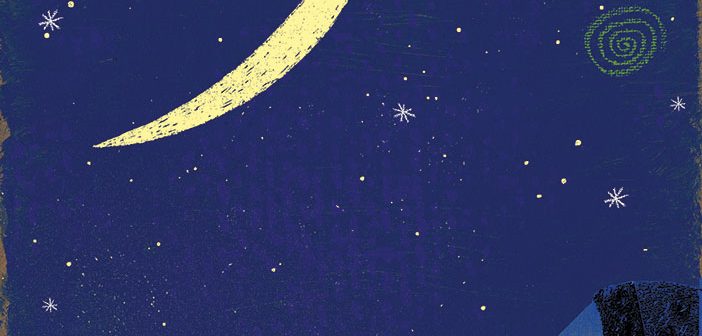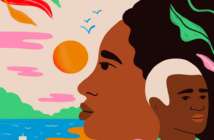How did humans evolve to have reason, consciousness, and free will? An excerpt from Kenneth Miller’s latest book, The Human Instinct.
I’m hoping for a clear sky tonight. It’s expected to be the peak of the annual Perseid meteor shower, a chance to glory in streaks of sudden fire as fragments of a comet come crashing through the Earth’s atmosphere. In between those moments of spectacle, there will be a chance to lie still in the darkness and absorb the quiet beauty of the nighttime sky. The experience has always made me feel small against the vastness of space, but it’s also one that has helped me, as a biologist, appreciate what it means to be human. Although I expect to be alone in my small backyard, I’m not the only one who will be looking up tonight. Tens of thousands of people will be watching around the world, a quiet and widely scattered assembly of those who remain fascinated by such events year after year.
Consider the setting. Joined by these many others, I’ll lie back against the surface of a small, rocky planet, peering up in wonder at the twinkling riot of forms and colors and patterns. The sparkling fire of the meteors is new, generated only a fraction of a second before it flashes across the sky. The tapestry of starlight, however, is a sampling of history, some of it unimaginably ancient. I orient myself by Polaris, the north star, fully aware that the stream of steady light it provides is more than four hundred years old. Sirius is much brighter, owing to its nearby position. Its light took just eight and a half years to reach me.
Of all the creatures, of all the forms of life that grace the surface of this small planet, there is only one that looks this way into the nighttime sky. Only one knows the Perseid spectacular is coming. Only one plots the distances to stars. Only one contemplates the age of its universe, only one is aware of the mysteries to be solved in starlight. While all of life is one, while all of life is linked by ancestry, structure, and design, only the human creature seeks answers to questions in the stars. This is what makes it worthwhile to consider how this creature came to be, and what its presence on this planet means.
Adam’s Promise
For people in Western cultures, the character of Adam once defined the essence of human nature both in promise and tragedy. As author Marilynne Robinson ’66 has noted, the story of evolution brought on the collapse of the Genesis narrative, and with it, in her view, the enlightened humanism that produced Western civilization and gave birth to the very science that would, ironically, lay waste to the myth of Eden itself. To her and many others, Adam was much more than a pseudo-explanation for the origin of our species. He was the metaphorical source of man as a moral creature with obligations to family, community, and ultimately to the righteousness of truth. While evolution is surely true, as Robinson admits, what it put in Adam’s place was hardly a satisfactory image to replace these fine qualities:
For old Adam, that near-angel whose name means Earth, Darwinists have substituted a creature who shares essential attributes with whatever beast has recently been observed behaving shabbily in the state of nature. Genesis tries to describe human exceptionalism, and Darwinism tries to discount it.
I think Robinson is fundamentally wrong about the implications of what she calls “Darwinism.” That is, in fact, my reason for writing this book. But she is surely right about the conclusions many have drawn from the emerging story of human evolution. We could begin with the very exceptionalism she tries so valiantly to defend. Henry Gee, in his book The Accidental Species, also discounted such exceptionalism. Nothing, he wrote, is uniquely present in our species, including attributes such as language, toolmaking, intelligence, mathematics, or even self-awareness. So, we have no reason to presume ourselves special, unique or, as Gee gleefully points out, the “pinnacle of Creation.” We’re just not that big a deal, and we have no business thinking otherwise.
Gee’s gospel of insignificance states that evolution was not bound to produce us or anything like us. The drama of evolution plays out not in an irresistible rise to perfection, but in a random walk through endless possibilities, none more significant than the other, none especially worthy of our attention.
If these constructions tend to devalue human life just a bit, in the eyes of many interpreters of “Darwinism,” there are even more depressing findings to deal with. Our bodies, our minds, our behaviors have all been shaped by the harsh demands of survival in the face of the relentless pressures of natural selection. As a result, however sophisticated we may seem, we are rude creatures at heart, motivated by drives and values that serve principally to propagate our genes and ensure our own survival and that of our kin. As Richard Dawkins once wrote, “Let us try to teach generosity and altruism, because we are born selfish.” The endowments of evolution apparently include a surplus of ruthless greed and aggression, but a deep and telling absence of love and kindness, virtues that, according to Dawkins, are not inherent in our species and can only be passed along by deliberate effort.
To all too many, the answers that emerge from the Darwinian narrative are dark, foreboding, and deeply unsettling. First among these is the conviction that our minds are not our own. They surely were not formed in the image and likeness of a supreme being, and they were not even fashioned in a way that allows us to seek the truth of our own existence. Rather, our brains are organs like any other, only one component of a survival machine designed to resist death just long enough to push its genes forward into the next generation of struggling, highly socialized primates. Evolutionary psychology can explain our moral values as instinctive behavioral patterns hewn only by selection for life within the group. Art is made to attract mates, altruism is practiced for selfish reasons, even if we “think” otherwise, and “truth” is a constructive illusion connected only loosely to an unknowable reality. Freedom of thought and action is part of that illusion, a lie the brain tells itself to allow the human animal to function in a way that enhances its chances of success. High culture is not the work of genius, but the product of chance adaptations working in many brains to sculpt a veneer of beauty around the mundane realities of life and struggle. Beauty itself is defined only by its ability to produce such illusions as allow us to go on under the absurd circumstances of personal futility and ultimate death.
Seen by those who would explain every impulse, from anger to joy to love, in Darwinian terms, the human project seems worthy of neither pride in past nor hope for the future. If even consciousness is an illusion, then it is pointless to contemplate that future, seek wisdom in the past, or celebrate human achievement. By contrast, the myth of Adam once affirmed a genuine humanity. It told us that choices were freely made, that their consequences were genuine, and that rebellion made possible by truly independent thought was an essential part of human nature. It was for such reasons that Marilynne Robinson lamented the “death of Adam” in terms like these:
Our hypertrophic brain, that prodigal indulgence, that house of many mansions, with its stores, and competences, and all its deep terrors and very right pleasures, which was so long believed to be the essence of our lives, and a claim on another’s sympathy and courtesy and attention, is going the way of every part of collective life that was addressed to it—religion, art, dignity, graciousness.
While certainly not a creationist in the sense of denying evolution, Robinson perfectly articulates the profound concerns of those who recoil from extremes of the “Darwinism” she describes in such chilling terms. But her view of evolution as a denial of human nature, as a nihilistic project that devalues not just religion, but art, music, literature, and even science, is, I believe, profoundly wrong. What evolution tells us about human nature projects an entirely different vision of our species. It invites us to revel in the living world of which we are a part and to see ourselves as central characters in the greatest drama the universe has yet brought forth. It is a story that fully matches the sense of grandeur with which Charles Darwin once tried to endow his greatest theory, and we should delight in telling it.




